Ivermectin Cocktail Blocks Metastases in Key Cancers (2025)
Ivermectin is also the #1 repurposed drug in the Marik-Hope CSC Protocols as it blocks or suppresses at least seven Key CSC (cancer stem cell) Signaling Pathways.
Today, we share powerful evidence - helped by AI - in finding the precise Repurposed Drug Combinations that can prevent Stage 1 or Stage 2 cancers from progressing to deadly Stage 4 disease.
And now, allow me to share AI’s astonishing confirmation of the protocols which Dr. Paul E. Marik and I developed following our last few years of research.
I. Prostate Cancer
This is the most common cancer in men.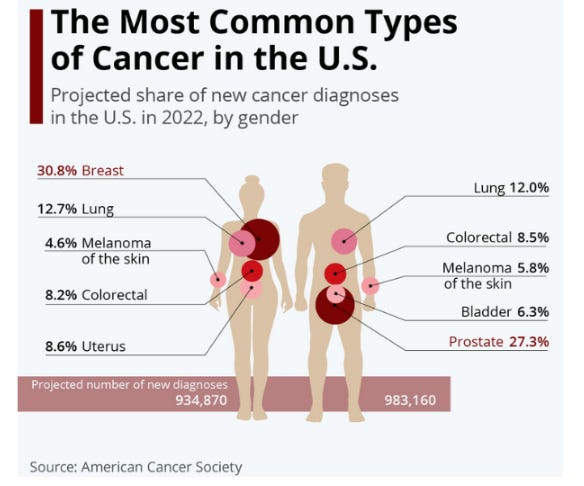
While accounting for 27.3% of new cancer cases in men, Prostate Cancer has a nasty habit of metastasizing. Following early treatment with radical prostatectomy, most patients do well for a few years.
Longer-term outcomes are problematic. Almost half develop recurrence and metastases within 15 years.
The synergistic use of repurposed drugs and dietary supplements represents a compelling adjunctive approach for prostate cancer treatment.
By targeting multiple cancer pathways simultaneously, particularly those involved in cancer stem cell (CSC) maintenance and metastatic potential, these agents may significantly alter disease trajectory when combined with standard treatments for stage 1 prostate cancer.

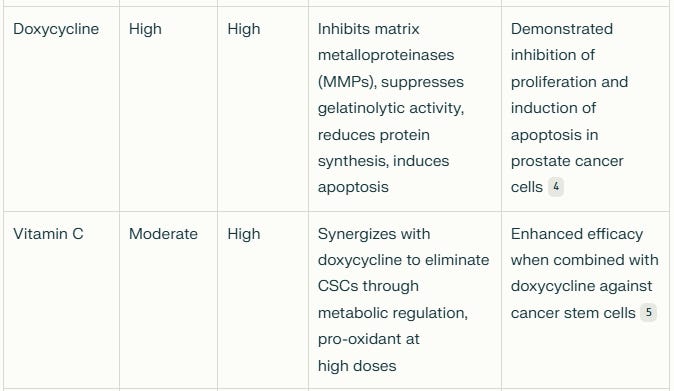
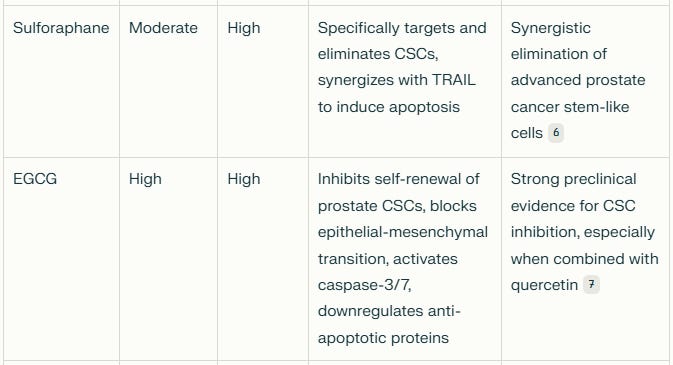
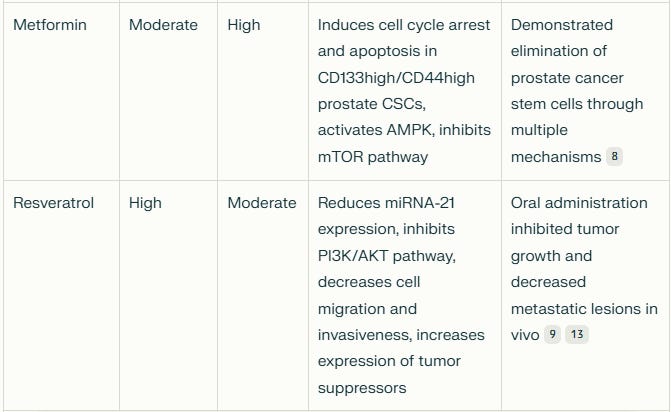

 The key agents that prevent metastasis in Prostate Cancer are ranked in order of their importance:
The key agents that prevent metastasis in Prostate Cancer are ranked in order of their importance:- Doxycycline
- EGCG
- Ivermectin
- Sulforaphane
- Vitamin C
- Metformin
- Resveratrol
Which brings us to the most common cancer in US women, breast cancer, which accounts for 30.8% of cases.
II. Breast Cancer
While the majority of patients with Stage I and II breast cancer achieve long-term survival without recurrence, a significant minority will experience disease return.
Recurrence rates range from approximately 7-21% for Stage I disease (depending on tumor size) and around 16% for Stage II disease over 15 years.
Again, the question remains how to prevent metastatic disease.
While fewer than 1% of US Oncologists offer repurposed drugs to target CSCs, AI reports that use of such protocols can substantially reduce the risk of metastatic progression.

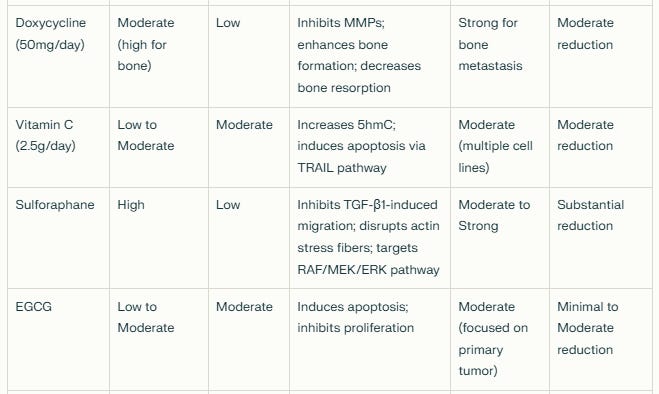
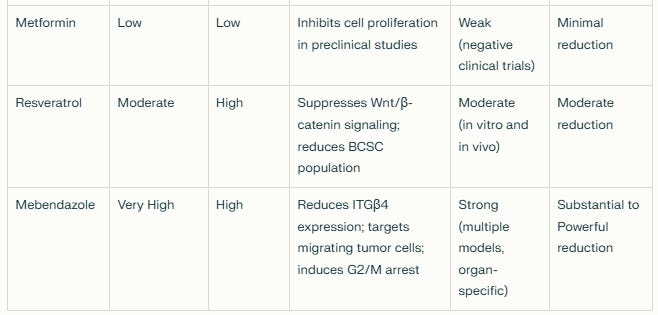
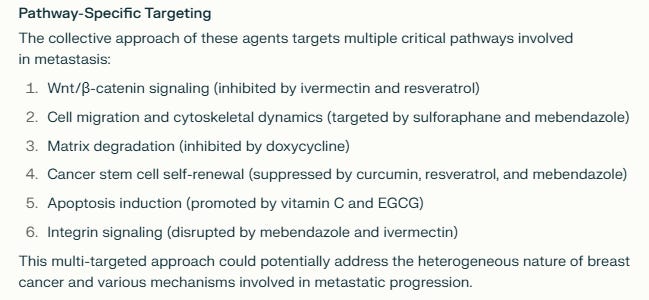

The strongest components of the Repurposed Drug Cocktail in suppression of Breast Cancer metastases in order of effectiveness are:
- Mebendazole
- Ivermectin
- Curcumin
- Resveratrol
- Doxycycline
- Vitamin C
- EGCG
The next most common tumor is Colorectal Cancer.
III. Colorectal Cancer
Colorectal cancer comprises roughly 8% of cancer cases in the United States.
Metastatic Disease in Colorectal Cancer:
The incidence of metastatic disease in colorectal cancer patients is a major clinical challenge. Approximately 20% of patients have metastatic disease at initial diagnosis, and another 25% who present with localized disease will later develop metastases.
This suggests that nearly half of all colorectal cancer patients will experience metastatic disease at some point during their illness.
Studies indicate that up to 80% of metastatic colorectal cancers likely spread to distant locations before the original tumor exceeds the size of a poppy seed.
These findings suggest that many colorectal cancers may spread long before detection by current screening methods, emphasizing the need for improved early detection strategies - and the adoption of repurposed drug & supplement strategies.
The time to recurrence also varies by stage, with more advanced stages recurring sooner. The median time from surgery to recurrence was 22.6 months for Stage I disease, 18.2 months for Stage II disease, and 15.9 months for Stage III disease. This pattern highlights the more aggressive nature of advanced disease.
Anti-Metastatic Pathways:
Each repurposed agent demonstrates unique mechanisms for inhibiting the metastatic cascade in colorectal cancer.
Ivermectin significantly inhibits the motility of cancer cells in vitro and tumor metastasis in vivo by regulating the Wnt/β-catenin pathway, a crucial signaling axis in colorectal carcinogenesis.
Curcumin activates the ROS/KEAP1/NRF2/miR-34a/b/c cascade, inducing apoptosis and senescence while suppressing migration and invasion in colorectal cancer cells. The effects appear independent of p53 status, making curcumin potentially valuable for p53-mutated tumors.
Metformin demonstrates the strongest clinical evidence among these agents. Meta-analyses of clinical studies show that metformin use significantly reduces colorectal adenoma and cancer incidence while improving overall survival and cancer-specific survival outcomes. For patients with established colorectal cancer, metformin appears to reduce the risk of progression and metastasis development.
Cancer Stem Cell Inhibition:
Cancer stem cells (CSCs) represent a critical target for preventing metastasis, as they drive tumor initiation, progression, and recurrence.
Ivermectin inhibits clonogenic self-renewal of colon cancer stem cells and reduces expression of intestinal stem cell genes ASCL2 and LGR5.
Sulforaphane effectively prevents cellular spheroid formation and decreases ALDH1 activity, a key cancer stem cell marker in colorectal cancer.
EGCG from green tea demonstrates multi-faceted anti-cancer activities by downregulating STAT3 signaling, which plays a crucial role in cancer stem cell maintenance. By targeting these stem-like populations, these agents may prevent the establishment of metastatic colonies that drive disease progression.
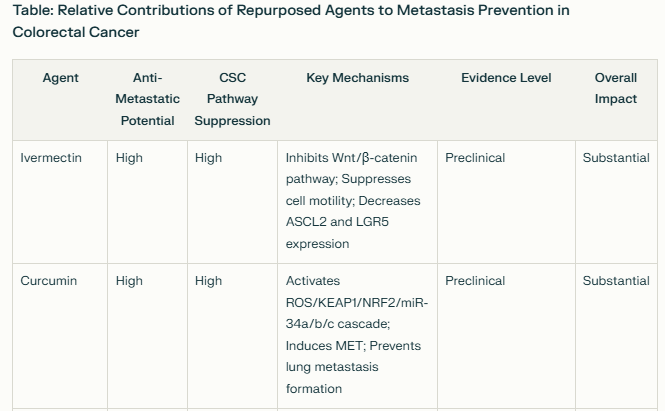
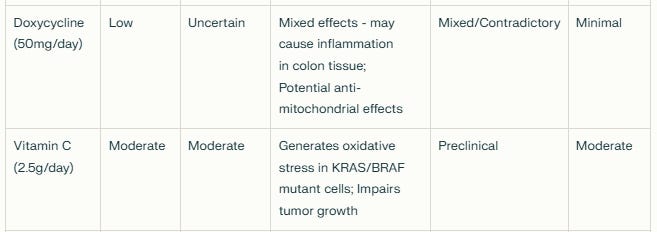


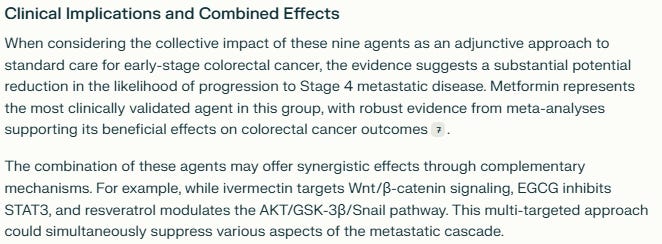
In summary, the most effective anti-metastatic agents in Colorectal Cancer are as follows:
- Ivermectin
- Curcumin
- Sulforaphane
- Metformin
- Resveratrol
- EGCG
- Mebendazole
IV. Lung Cancer
Lung Cancer makes up some 12% of all US cases. And because they are often encountered late in the disease, the risk of late-stage metastases is greater.
Metastatic Progression in Lung Cancer
Metastasis in lung cancer represents a complex, multifaceted process that significantly influences patient outcomes.
Lung carcinomas are frequently detected at an advanced metastatic stage, with cancerous cells spreading through both lymphatic and blood vessels. Notably, approximately 40% of newly diagnosed lung cancer patients already exhibit metastatic disease at the time of initial diagnosis.
This high rate of presentation with metastasis contributes significantly to the poor overall prognosis associated with lung cancer.
The process of metastasis typically develops gradually, often producing minimal or no symptoms until the metastatic tumors grow large enough to affect neighboring organs.
When examining resected lung carcinomas, vascular invasion can frequently be observed even in low-stage tumors, which subsequently leads to increased recurrence rates and diminished survival prospects.
This suggests that the start of metastasis may be present early in the disease course, even before clinical detection becomes possible.
Metastatic progression varies significantly based on the histological subtype of lung cancer.
Small cell lung cancer (SCLC), known for its aggressive nature, demonstrates particularly high recurrence rates, with approximately 70% of patients experiencing recurrence, typically within one to two years after completing initial treatment.
In contrast, non-small cell lung cancer (NSCLC) shows variable recurrence patterns based on initial stage.
The location of recurrence also affects survival outcomes.
Patients who develop distant metastasis are more likely to die within five years of surgery compared to those with locoregional recurrence (6.8% versus 2.6%, respectively).
For patients diagnosed with Stage I lung cancer, approximately 30% will experience recurrence typically within five years, while for those with Stage IV disease, the chance of relapse rises to 70%.
Prevention of Lung Metastases:

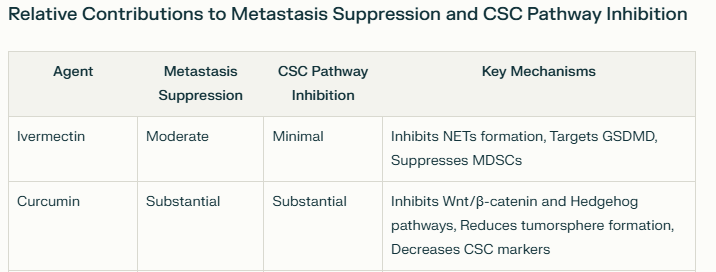



The most important repurposed drugs in suppressing lung metastases in order of effectiveness are:
- Curcumin
- EGCG
- Metformin
- Mebendazole
- Sulforaphane
- Doxycycline
- Resveratrol
In NSCLC, a specific Lung Cancer subtype, Mebendazole is the most active metastatic blocker, while Ivermectin is second.
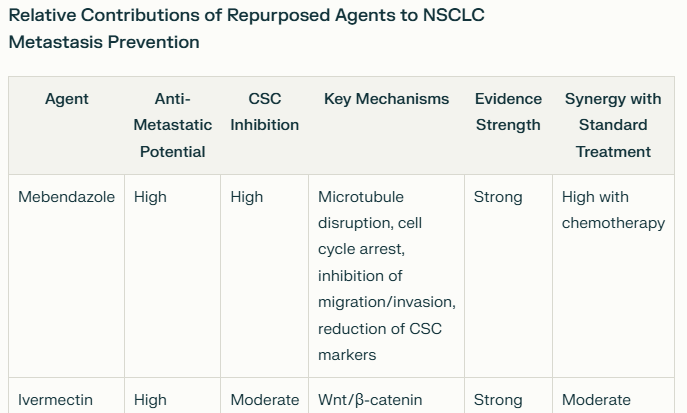
.png)

.png)






Comments
Post a Comment